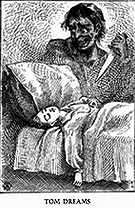Surprised, because, it is, after all, quite common. You can find "Injun" and "Honest Injun" in older books that are widely read today, like:
The Adventures of Tom Sawyer--published in 1876, where "evil is embodied in the treacherous figure of Injun Joe" (pg. x of the intro to The Adventures of Tom Sawyer and Adventures of Huckleberry Finn, a Signet Classic book published in 2002), and in the oath used several times by characters.
Seems to me, in my cursory study of the phrase, that it may have been coined by Twain. In the entry on "Injun," the Oxford English Dictionary (OED) lists Twain as the first person to use "Injun." It also lists several other noted writers who used "Honest Injun." Some are George Bernard Shaw in 1896 and James Joyce (in Ulysses) in 1922.
Comment: I find it hard to believe that no one used "Injun" before Mark Twain in 1876. But I have no evidence that this claim is wrong.
For more on Steele, see Calling BS on Steele's "Injun" and Steele's Hypocrisy on Racial Slurs. For more on Twain, see Is Huck Finn Racist? and Mark Twain, Indian Hater.
Below: Injun Joe.


4 comments:
But I don't understand how finding the word in HUCK FINN, of all places, could persuade anyone that it's not offensive.
I doubt he was the first person, but probably the first who recorded it in a literary form that lasted. I would bet that it appeared in popular periodicals of the time etc.
Didn't James Fenimore Cooper use the term? I'm pretty sure that Philip Deloria discusses it in his book "Playing Indian." If I recall correctly, Cooper uses it in a novel in the early 1800s as an insult against poor whites involved in land disputes against rich white landlords; he distinguishes it from his noble - and vanishing - Indian. Injun is clearly demarcated as an insult, in any case. I don't have the book here at home, but I can double-check once I'm in my office again. I'm also fairly certain that Deloria says Cooper's use reflects the usage of the time and isn't that he coined the term. I last read the book several years ago, though, so my memory is a bit vague, but the assertion that it first arises in Twain also struck me as unlikely.
Good call, Miriam. Yes, Cooper used "Injun" many times, as you can tell from this Google Books search:
http://books.google.com/books?lr=&q=inauthor:%22James+Fenimore+Cooper%22+injun&sa=N&start=0
Cooper may have used it first in The Last of the Mohicans (1826). If the OED said Twain was first, the OED is mistaken.
Post a Comment